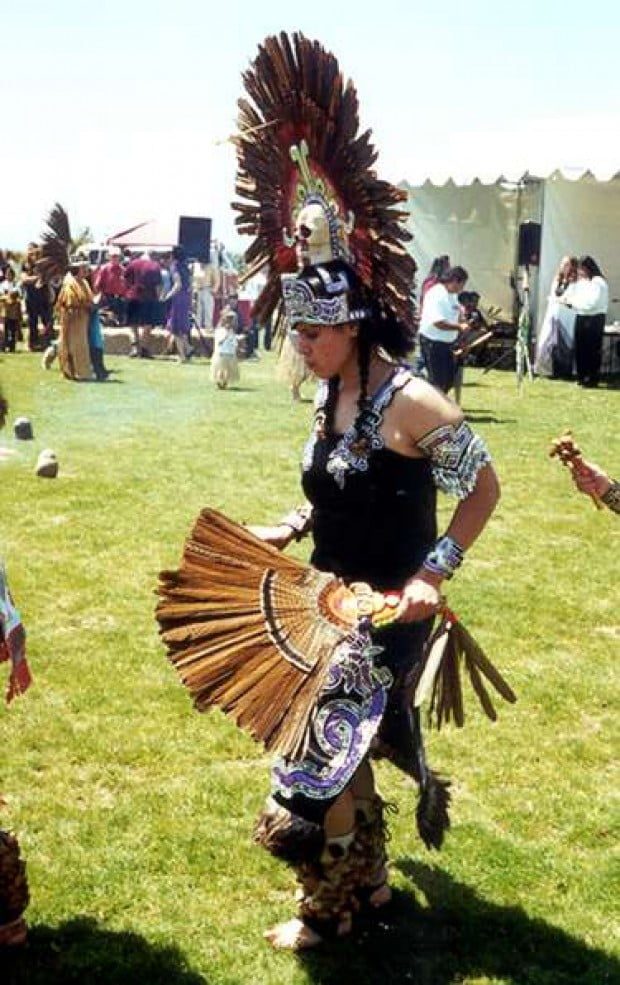Suzanne Marcus Fletcher/Special to The Malibu Times
Hundreds of Malibu residents, coupled with a significant influx of Southern California visitors, descended on Bluff’s Park Sunday to take part in the third annual “Chumash Day,” in celebration of Malibu’s indigenous heritage and to honor the planet in an annual event gaining greater public attention, called Earth Day.
In brilliant traditional attire, Native American artists, singers and dancers from diverse cultural backgrounds participated in ancient ceremonies, dance, music and a collective sharing of oral traditions in appreciation of Malibu’s earliest inhabitants, the Chumash, a tribe still referred to by some, as “the Western gatekeepers.”
“When we honor the Chumash spirit, we honor the earth and ourselves,” said one participant.
On a day made to order, the organized if not seamless event, hosted by The City of Malibu and The Native American Cultural Resources Advisory, was initiated to educate the public about Malibu’s strong Native American ancestry.
“I am very pleased with how the event turned out,” said Francine Greene, co-director of Chumash Day, who appeared delighted that everyone scheduled to appear was in attendance.
Michael Reifel, from the San Carlos Apache tribe of southern Arizona, was the event’s master of ceremonies. He said that pow-wows and events such “Chumash Day” “are incredibly effective and necessary for the public’s understanding of other cultures. This is how we break down prejudice,” he said, “and how we build support.”
That sentiment was further echoed by Lomita visitor, George Broadstone, 48. “A lot of us are urban Indians, disconnected from the reservation and a connection to our culture,” he said. “My father was Chumash from Santa Barbara. As you grow older, you meet people [at these events] and interact with them. You get more connected to your spiritual side.”
As to the remaining influence of the Chumash, “You can’t turn over a stone in Malibu or a building without finding some sign that my ancestors were here,” said Red Star, a descendent of the Chumash and core participant in the event’s ceremonial activities. “We keep learning little bits about our history,” he said. “As people start learning about who they are from a little tid-bit their grandma or grandfather told them, we find these hundreds of tid-bits have made a foundation. We have a place in this society. We belong here.”
Native American diversity was in evidence as artists, performers and vendors from Los Angeles, New Mexico’s Aztec community as well as Polynesian dancers who call themselves “Na Hoaloha O’ Polynesia,” came to contribute the flavor and nuance of their particular clan, tribe or group. A notable dancer named Ocelot, from the Aztec dance group called “Nallhi-Ollin,” says he became involved in traditional dancing “when a friend invited me to practice one day. It was a feeling inside my heart. I enjoyed it.”
Chumash Day proved an ideal setting for families to gather and bring their children to witness and participate in the dances and rituals, ride ponies, and to simply have fun. Former Malibu resident, Davis Alexander, who attended with her husband Justin Marcus and two children, said it was her first time at the event and that she plans to return next year. Alexander taught English as a second language and math on the Navajo reservation years earlier, but had not the opportunity to connect with Malibu’s Chumash community prior to this event.
“My children love ceremony and ritual, so this is very meaningful to them,” said Alexander, who added that her children attend a school whose curriculum facilitates “an understanding of our ties to the earth and to indigenous people everywhere. Children understand being connected to the earth, because they haven’t forgotten what’s taken us so many years to forget.”
Malibu Canyon resident, Marlon Hoffman, 48, learned about Chumash Day by happenstance. “I have friends who meet here every Sunday morning. We couldn’t meet [today] and I found out this event was here. I am really glad, because I would like to honor the people whose land we live on.”
Cecilia Garcia, who has a wild, infectious laugh and propensity for dancing, is a no-nonsense medicine woman who says her specific calling is to “teach joy. I am the Chumash clown,” she said, “the reflection in the mirror.” Garcia has a blanket laid out on the park grass with a wide assortment of plants and objects that she uses to teach people about Native American medicine, and ultimately, about themselves. True to her mirror-image statement, Garcia is at turns laughing one minute and deadly serious the next, as she looks one young woman squarely in the eye and says, “You worry too much about others. You take on everyone’s problems. Honor yourself. Be kind, but not stupid.”
Nodding in agreement, the young woman does not appear shaken. Instead, she grows glassy-eyed and seems to appreciate Garcia’s candor. “There’s no mystery to our lives,” offered Garcia, “It’s about common sense and good manners.”


